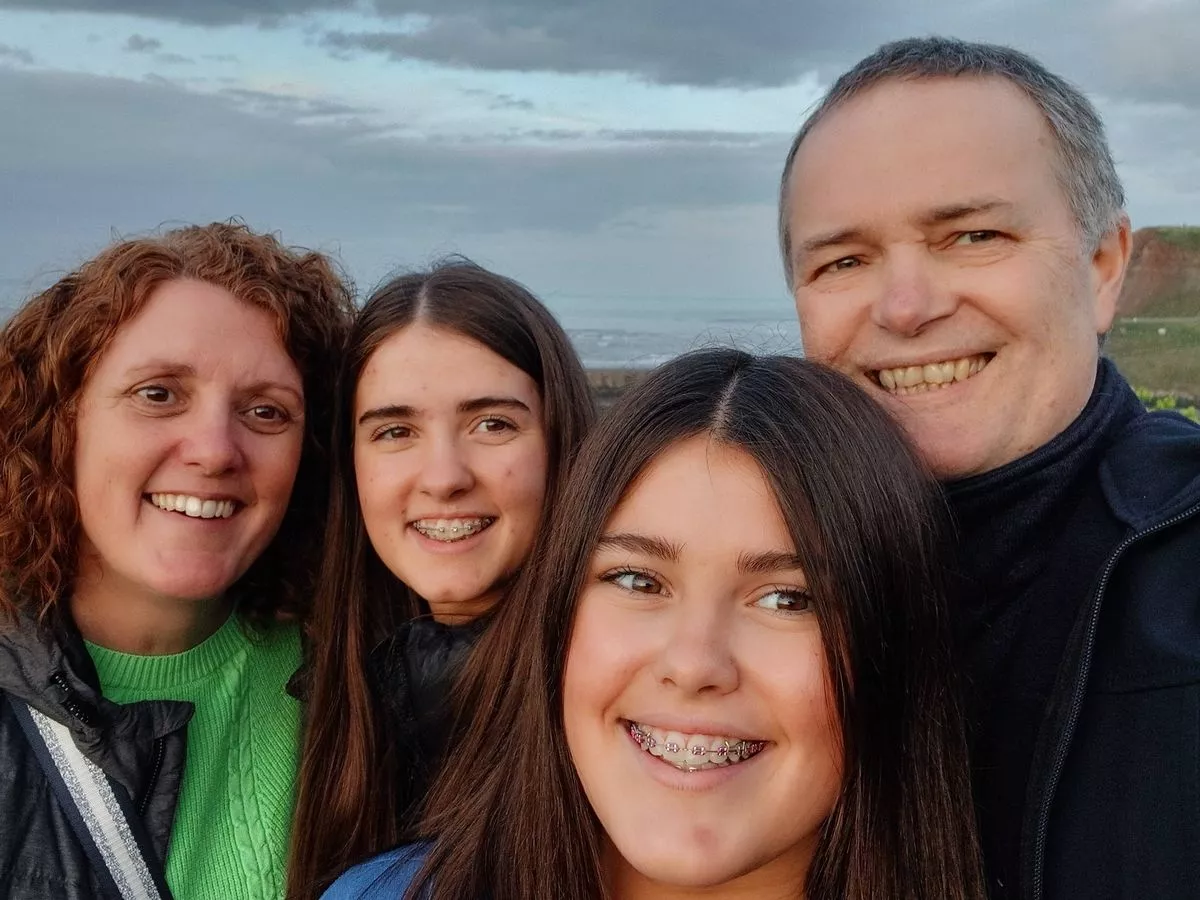Copyright manchestereveningnews

A dad who dismissed back pain and indigestion as signs of ageing tragically died just three weeks later. Geoff Follin thought he was 'just getting old' when he started experiencing the symptoms in February 2024. But the former school teacher turned music tutor was diagnosed with pancreatic cancer in May last year. Sadly, the 58-year-old died just three weeks after his diagnosis after being left he would palliative care straight away. Join the Manchester Evening News WhatsApp group HERE His wife, Nicola Follin from Upholland village in Skelmersdale, told how the family were left reeling by the devastating news. Nicola, 49, said: "As soon as they said pancreas, we both just looked at each other and thought the game's over pretty much. "You're just in shock really. Palliative, that was what was mentioned, and they got the palliative team in straight away, who were amazing. "He was in hospital for a couple more days and then discharged to home, with care being led by the hospice.", reports the Liverpool Echo . "We thought there were months left at that time, and I think the doctors thought there was going to be a few months as well." The couple have three children - Sam, 21, Isobel, 19, and Daisy, 17, who was sitting her GCSE exams at the time. Sadly, Geoff's health deteriorated rapidly, and he passed away just days after their 21st wedding anniversary. According to Pancreatic Cancer UK, the vague symptoms of pancreatic cancer mean that in up to 80 per cent of cases, the disease remains undetected until it has spread to other parts of the body. It is labelled as the "deadliest" common cancer, with over half of patients passing away within just three months of their diagnosis. Nicola has bravely shared her husband's story to back the launch of a national clinical trial into a breath test, which was unveiled today, Wednesday, October 29. The breath test is a project being developed by Imperial College London. In the initial two-year study, scientists analysed over 700 breath samples from individuals both with and without pancreatic cancer, as well as those suffering from other conditions affecting the pancreas. Pancreatic Cancer UK is now investing an additional £1,141,128.35 to advance the test to a multi-centre validation study, typically the final step before applying for regulatory approval and then seeking adoption by the NHS . Patients will be recruited from the NHS Urgent Suspected Cancer Pathway – under which patients should receive an appointment within two weeks of a GP referral. The trial, involving over 6,000 patients with an unknown diagnosis, will see around 40 trial sites established at hospitals across England, Scotland and Wales. At present, there are no screening or early detection tests available to help doctors identify pancreatic cancer. Geoff underwent an ultrasound and a CT scan. But he and Nicola were still awaiting the results when, during a visit to A&E, they received the devastating news that he had terminal cancer. Nicola said: "Before Geoff was diagnosed, we weren't really aware of pancreatic cancer. Only in so much as it's a death sentence really, because often by the time they find it, it was too late. "The breath test might have saved his life, mightn't it? Or he could at least have had another year or so with us. We could have just been together more - the five of us were always very close. We just loved being together." Charity Pancreatic Cancer UK reckons the test, which takes a single breath sample from a patient, could transform the early detection of pancreatic cancer and rescue thousands of lives each year. Approximately 10,800 individuals are diagnosed with the condition every year throughout the UK. In the future, simply exhaling into a bag during a GP visit could become the crucial initial stage in offering far more patients the opportunity to undergo surgery, which remains the sole potentially life-saving treatment. The test identifies volatile organic compounds (VOCs) found in breath. Thousands of these substances circulate through the bloodstream, get filtered when blood passes through the lungs, and are then expelled through breathing. Cancer patients produce varying types of compounds, changes in which can be detected in the breath even at early disease stages. Identifying unique combinations of Volatile Organic Compounds (VOCs) could allow doctors to swiftly pinpoint individuals likely to have pancreatic cancer and prioritise them for urgent investigation. GPs suspecting pancreatic cancer can request imaging tests or refer patients to hospital for further investigations. However, the disease's vague symptoms are common to many less serious conditions, presenting a significant challenge for health professionals in deciding who should be referred for further investigation and who can be monitored or reassured. The breath test, designed to be accurate, non-invasive, and usable in a GP surgery or pharmacy, could significantly impact while remaining cost-effective for the NHS by streamlining referral pathways. Breath samples can be taken in as little as 30 seconds, and scientists believe it could be possible to provide GPs with the test results within just three days. This would enable patients most at risk to be referred quickly for scans to diagnose or rule-out pancreatic cancer. Diana Jupp, CEO of Pancreatic Cancer UK, stated: "The breath test has the potential to revolutionise the early detection of pancreatic cancer. It is, undoubtedly, the most significant step toward a lifesaving-breakthrough in 50 years. "While more years of development are still needed before we can put this exciting new technology into the hands of GPs across the country, thousands of patients with an unknown diagnosis will now help refine it in the real-world. "This is the first pancreatic cancer breath test to ever reach a national clinical trial of this scale. That in itself makes this a moment of real, tangible hope. "For decades the deadliest common cancer has been seen as too great a challenge to solve but we are determined to keep pushing the boundaries of what's thought possible. "To fully realise the potential to transform early detection, we need the government to commit to increasing investment in the expected National Cancer Plan. Finding this devastating disease early gives people the very best chance of lifesaving treatment." The revelation comes six months on from the 2025 TCS London Marathon, for which Pancreatic Cancer was the official charity partner. Hundreds of runners took on the ultimate test to help put the first-ever early detection test for the disease into the hands of doctors. Funds they raised will support projects like the breath test, and other world-class research.



